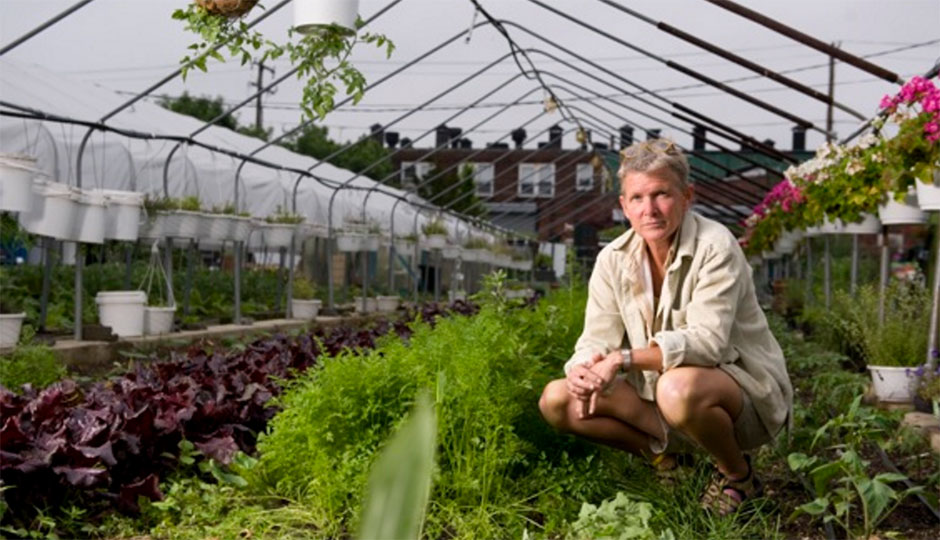Best of Philly 2008: The Best Philadelphian is Mary Seton Corboy

Photo courtesy Greensgrow Farm.
MARY SETON CORBOY IS just a farmer. A farmer in a faded Greensgrow Farm t-shirt and two right-handed gardening gloves. A farmer with a constant tan, and dirt permanently embedded under her fingernails. A farmer with business cards and a BlackBerry in the pocket of her fraying cargo shorts, even as she tends to the first of the season’s tomatoes.
If you’ve stopped to think about farmers recently — and be honest, you probably haven’t — you didn’t picture Mary, lean and tough at 50, her 12-hour workdays as likely to be filled with board meetings as beekeeping, her BlackBerry ringing with calls from Tony “Rolls,” who delivers Italian loaves for the farm’s twice-weekly market, and Mayor Nutter, who has studied Mary’s farming model. Because if you’ve stopped to think about farms recently — and maybe you have, hungry for August’s harvest of tomatoes and corn, blackberries and peaches — you didn’t picture Greensgrow, the single city block in once-industrial Kensington, just four miles from City Hall, where for 10 years Mary has been cultivating lettuce, tomatoes, and a new attitude toward food.
We need one. This is the era of the killer tomato (salmonella), killer spinach (e. coli) and killer food prices. The Greensgrow Philadelphia Project isn’t the only organization in the city addressing food safety and other topics that once seemed, at best, dryly academic. But this farm and its sarcastic farmer are a solution we can touch, an immediate, completely edible model of a sustainable food system.
“It’s not like we’re happy that we’re in the situation we’re in, but … ” If you’re waiting for Mary to say “I told you so,” it’s not coming. The woman has work to do. “But it has all converged at a time when we can help solve the problems,” Mary says.
IT’S A SURPRISE, every time, to discover Greensgrow, just off of I-95, between the Applebees and Thriftways of Aramingo Avenue and the still-operating factories of York Street. The block is far from bucolic, with makeshift greenhouses and cinder-block-and-plywood structures, fenced in with eight-foot chain-link rimmed with barbed wire. But in a neighborhood of tightly packed rowhomes, an acre of open space is an unexpected luxury.
When political-scientist-turned-chef-turned-gardener Mary and her then-business partner, Tom Sereduk, first saw the space more than a decade ago, it was a trash-strewn Superfund site, the former home of a galvanized steel plant. Still, the rent on the property, owned by the New Kensington Community Corporation, was just $150 a month. So this is where Mary and Tom would grow lettuce, gourmet greens to grace the plates of the city’s top restaurants, and pursue their goal of introducing more green businesses to Philadelphia. It was a crazy idea — Mary’s known for them, proud of them, and very often right about them — and it worked. The words “sustainable” and “green collar” might have been abstract, but the phrase “fresh vegetables” wasn’t. Thirteen varieties of tender lettuce grew hydroponically — oh, you thought a farm should have fertile soil? Ha! — on the sunny lot, flourishing in a system of rain gutters flushed with nutrient-rich water; the city’s restaurants, in the early stages of the “buy fresh, buy local” craze, purchased everything the farm could produce, 300 pounds a week.


